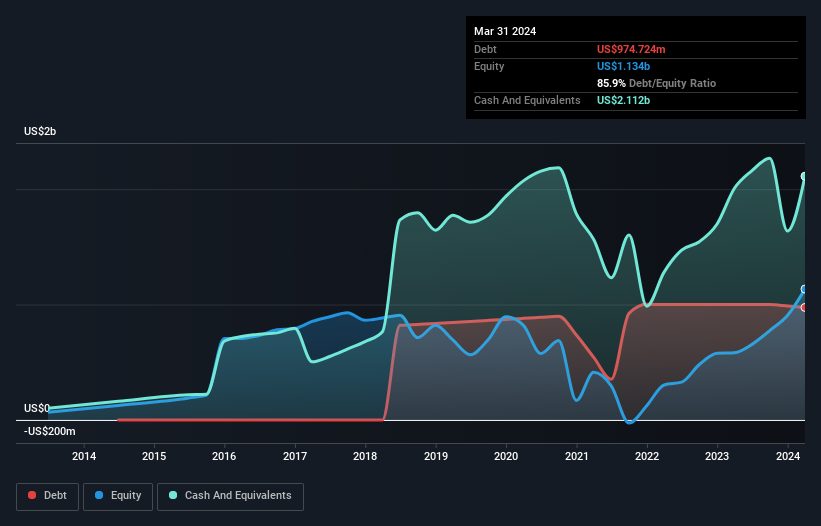Is Atlassian (NASDAQ:TEAM) Using Debt In A Risky Way?
Some say volatility, rather than debt, is the best way to think about risk as an investor, but Warren Buffett famously said that 'Volatility is far from synonymous with risk.' So it seems the smart money knows that debt - which is usually involved in bankruptcies - is a very important factor, when you assess how risky a company is. We note that Atlassian Corporation (NASDAQ:TEAM) does have debt on its balance sheet. But should shareholders be worried about its use of debt?
What Risk Does Debt Bring?
Debt assists a business until the business has trouble paying it off, either with new capital or with free cash flow. Ultimately, if the company can't fulfill its legal obligations to repay debt, shareholders could walk away with nothing. While that is not too common, we often do see indebted companies permanently diluting shareholders because lenders force them to raise capital at a distressed price. Having said that, the most common situation is where a company manages its debt reasonably well - and to its own advantage. The first thing to do when considering how much debt a business uses is to look at its cash and debt together.
See our latest analysis for Atlassian
How Much Debt Does Atlassian Carry?
The chart below, which you can click on for greater detail, shows that Atlassian had US$974.7m in debt in March 2024; about the same as the year before. However, it does have US$2.11b in cash offsetting this, leading to net cash of US$1.14b.
How Strong Is Atlassian's Balance Sheet?
According to the last reported balance sheet, Atlassian had liabilities of US$2.47b due within 12 months, and liabilities of US$1.46b due beyond 12 months. Offsetting this, it had US$2.11b in cash and US$646.1m in receivables that were due within 12 months. So its liabilities total US$1.17b more than the combination of its cash and short-term receivables.
Given Atlassian has a humongous market capitalization of US$46.6b, it's hard to believe these liabilities pose much threat. Having said that, it's clear that we should continue to monitor its balance sheet, lest it change for the worse. While it does have liabilities worth noting, Atlassian also has more cash than debt, so we're pretty confident it can manage its debt safely. When analysing debt levels, the balance sheet is the obvious place to start. But ultimately the future profitability of the business will decide if Atlassian can strengthen its balance sheet over time. So if you want to see what the professionals think, you might find this free report on analyst profit forecasts to be interesting.
In the last year Atlassian wasn't profitable at an EBIT level, but managed to grow its revenue by 24%, to US$4.2b. With any luck the company will be able to grow its way to profitability.
So How Risky Is Atlassian?
While Atlassian lost money on an earnings before interest and tax (EBIT) level, it actually generated positive free cash flow US$1.3b. So although it is loss-making, it doesn't seem to have too much near-term balance sheet risk, keeping in mind the net cash. One positive is that Atlassian is growing revenue apace, which makes it easier to sell a growth story and raise capital if need be. But we still think it's somewhat risky. The balance sheet is clearly the area to focus on when you are analysing debt. But ultimately, every company can contain risks that exist outside of the balance sheet. For example, we've discovered 1 warning sign for Atlassian that you should be aware of before investing here.
If, after all that, you're more interested in a fast growing company with a rock-solid balance sheet, then check out our list of net cash growth stocks without delay.
Have feedback on this article? Concerned about the content? Get in touch with us directly. Alternatively, email editorial-team (at) simplywallst.com.
This article by Simply Wall St is general in nature. We provide commentary based on historical data and analyst forecasts only using an unbiased methodology and our articles are not intended to be financial advice. It does not constitute a recommendation to buy or sell any stock, and does not take account of your objectives, or your financial situation. We aim to bring you long-term focused analysis driven by fundamental data. Note that our analysis may not factor in the latest price-sensitive company announcements or qualitative material. Simply Wall St has no position in any stocks mentioned.

